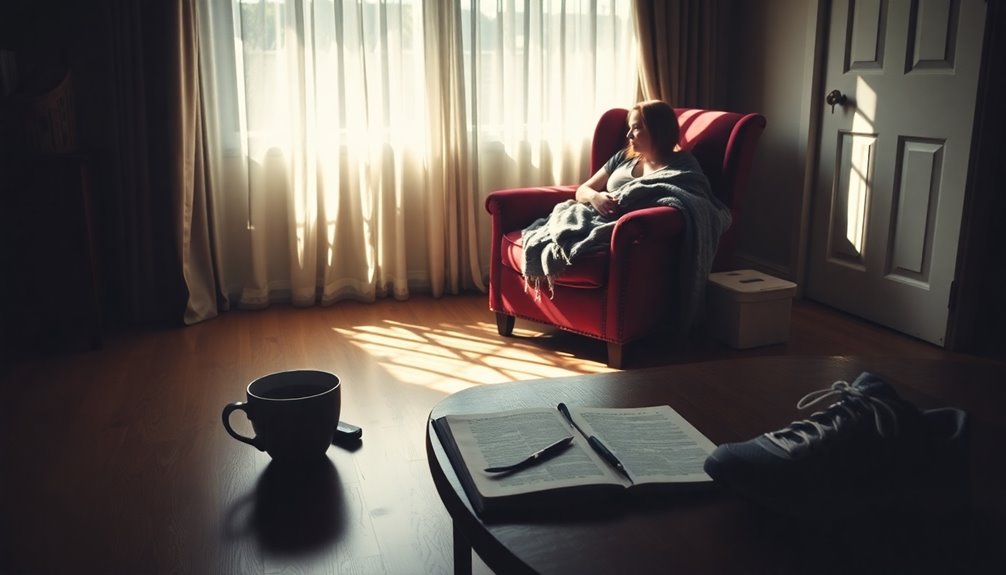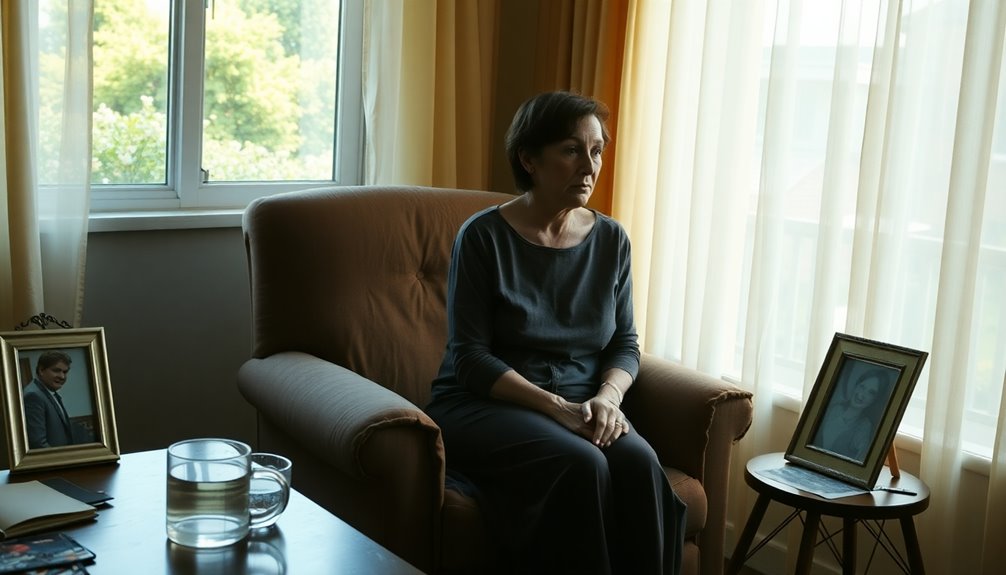Navigating widowhood can feel overwhelming, especially when dealing with intense loneliness and a yearning for connection. You might find that isolation increases over time, making it essential to nurture relationships with family and friends. Engaging in community activities or support groups can provide valuable emotional relief and help you rebuild your social network. Don't overlook therapy or journaling to process your feelings, either. Remember, finding new hobbies or volunteering can also ignite a sense of purpose in your life. There's so much more to explore about traversing this journey and embracing the opportunities that await.
Key Takeaways
- Building and maintaining social connections with family and friends is crucial for emotional support during widowhood.
- Engaging in community activities and volunteering can significantly reduce feelings of loneliness and foster a sense of purpose.
- Seeking therapy or counseling can provide valuable outlets for expressing grief and developing coping strategies.
- Physical activity not only enhances well-being but also combats loneliness, encouraging a healthier lifestyle.
- Exploring new hobbies and interests can help rebuild social networks and create fulfilling experiences in life after loss.
Understanding Widowhood and Loneliness

When you lose a spouse, it can feel like your world has turned upside down, thrusting you into a state of profound loneliness. Widowhood often brings a greater likelihood and intensity of loneliness compared to other marital statuses. As you navigate this new reality, you might find that the feelings of isolation can be more pronounced over time, especially if you're a widower, who statistically experiences deeper loneliness than widows.
The duration of your widowhood plays a significant role in how loneliness impacts you. The longer you remain widowed, the more acute and persistent these feelings may become. While remarriage can help mitigate loneliness, it's not a guaranteed solution. Your living situation and social network size also matter, but they won't fully determine how lonely you feel. Additionally, loneliness in widowhood can significantly impact your mental health, making it crucial to seek support. Research highlights that the evolution of social connections can be essential in addressing these feelings of loneliness.
It's essential to recognize that the quality of your social relationships—rather than just their quantity—holds the key to understanding your loneliness. Even if you have a supportive network, the depth of those connections influences your emotional experience. Ultimately, recognizing these factors can help you find effective ways to cope with your loneliness in this challenging time.
The Impact on Physical Activity

Loneliness markedly impacts physical activity levels, especially for older adults who are widowed. If you’re widowed, you might notice a significant decline in your physical activity due to feelings of loneliness. Research shows that you could experience a 150% decrease in your activity levels each year, with a notable 0. 06 hours less per week. This drop isn’t seen in married or unmarried individuals who don’t experience the same level of loneliness. Moreover, the social isolation that accompanies widowhood can lead to a vicious cycle, where decreased physical activity contributes to further feelings of loneliness and depression. As a result, many older adults may think twice about aging at home, realizing the importance of social interaction in maintaining their health and well-being. Engaging in community activities or joining exercise groups can provide both physical benefits and opportunities to connect with others, helping to counteract the effects of loneliness.
The reasons behind this are rooted in social control theory, which suggests that larger social networks encourage healthier behaviors. Without the motivation from a partner or supportive social circles, you might find it harder to stay active. Loneliness can diminish your self-regulation and motivation, leading to a cycle of inactivity. Additionally, studies indicate that loneliness correlates with reduced physical activity across different demographics, underscoring its widespread impact. Furthermore, engaging in regular physical activity can serve as a preventative measure against the negative effects of loneliness on health.
However, there's hope. Engaging in moderate to high physical activity not only combats loneliness but also enhances your sense of resilience and purpose. Activities like walking or gardening can improve your perception of aging and foster social interactions, helping reduce feelings of isolation. Remember, staying active can play a vital role in breaking the chains of loneliness you might be feeling.
Social Connections and Well-being

Staying active not only combats loneliness but also highlights the importance of social connections in enhancing well-being. As a widow, leaning on your family and friends can be essential during this challenging time. They provide the sympathy, attention, and emotional support you need to navigate your grief. Engaging with them helps you focus on positive emotions and fosters resilience.
Making new friends can be a powerful coping mechanism. By expanding your social network, you create additional sources of support that can alleviate feelings of isolation. Active participation in social activities markedly reduces depression, improving your mental health and overall quality of life. Additionally, having a supportive network can help mitigate the risk of account suspension due to neglecting personal well-being during difficult times. Regular social interactions can also enhance emotional well-being similar to the benefits of pet therapy for individuals facing challenges.
Community involvement also plays a key role. Strong relationships within your neighborhood and family can buffer the psychological effects of widowhood. When you perceive sufficient social support, you're less likely to experience considerable depressive symptoms.
Coping With Emotional Pain

Often, coping with emotional pain feels overwhelming, but there are effective strategies you can use to navigate through it. Engaging in therapy or counseling is a powerful way to express your feelings and explore the root causes of your pain. Techniques like Cognitive Behavioral Therapy (CBT) can help reframe those negative thoughts that weigh you down. Incorporating mindfulness and meditation into your routine encourages present-moment awareness, helping manage stress and anxiety. Regular physical exercise, including activities like walking or running, releases endorphins, acting as a natural mood booster and can also support healthy habits that improve overall well-being. You might also find solace in artistic expression, using painting, writing, or music to channel your emotions. Additionally, it's important to recognize that emotional pain can lead to physical symptoms, highlighting the interconnectedness of mental and physical health.
It's important to maintain a balanced lifestyle. Focus on healthy habits like proper nutrition and adequate sleep, which strengthen both body and mind. When feelings become intense, grounding techniques can keep you anchored in the present. Don't underestimate the power of labeling your emotions; putting feelings into words diminishes their intensity. Journaling offers a safe space to process thoughts. Remember, seeking professional help is essential if emotional pain persists. You don't have to face this journey alone; support networks are significant for healing.
The Role of Education and Skills

Education and skills training play an essential role in empowering widows, helping them regain control over their lives. By participating in skills training programs, you can acquire knowledge and practical skills that not only boost your employability but also pave the way for entrepreneurship. Here are three key benefits of such training:
- Economic Independence: Skills training equips you with market-demand skills, making you a more attractive candidate for higher-paying jobs or enabling you to start your own business. This economic empowerment enhances your financial stability and that of your family, ultimately breaking the cycle of poverty that many widows face. Additionally, understanding filial responsibility laws can help you navigate financial obligations to family members, ensuring a more secure future.
- Building Confidence: Engaging in skills training boosts your self-esteem, giving you a renewed sense of purpose. The ability to earn a living fosters self-worth and helps you make informed decisions for your family's future.
- Community Support: These programs often create supportive networks, allowing you to connect with other widows. This sense of community not only provides emotional support but also opens doors to valuable networking opportunities.
Support Networks and Resources

Support networks and resources are crucial lifelines for those traversing the journey of grief and loneliness. You don't have to navigate this path alone. Online platforms like Griefnet.org and Widownet.org offer email support groups and essential information tailored for widows and widowers. Joining forums such as Grieving.com connects you with thousands who share similar experiences, providing a sense of community. Additionally, GriefShare offers nationwide weekly meetings for shared support that can help individuals feel less isolated. It's important to remember that these support systems can be as vital as foster parent pay in providing necessary assistance during difficult times.
Local support groups like GriefShare and OUR HOUSE in Los Angeles County meet regularly, giving you a safe space to express your feelings and receive encouragement. If you're dealing with specific losses, resources like The Compassionate Friends or POMC can provide specialized support.
Professional counseling is another important resource. Many funeral homes and grief centers offer individual counseling, and organizations like the Association of Death Education & Counseling (ADEC) provide a wealth of information on coping with loss. If you need immediate help, the Los Angeles County Department of Mental Health has a 24/7 helpline.
Utilizing these networks can greatly ease your journey through grief, offering comfort, understanding, and tools to help you heal.
Navigating Special Occasions

Special occasions can feel overwhelming when you're managing life after loss. Days like anniversaries, birthdays, and holidays often amplify feelings of loneliness and sadness. The absence of your spouse can trigger profound emotions, even if you think you're coping well. You might find yourself surrounded by celebrations yet feel isolated, as if everyone else is enjoying life without you.
To navigate these challenging times, consider these strategies:
- Create New Traditions: Establishing your own rituals can help make special occasions more bearable. They can be small, like baking a favorite dish or lighting a candle in memory.
- Reach Out: Don't hesitate to connect with friends or family. They can provide support and companionship, helping alleviate feelings of isolation. Larger networks may also help mitigate the impact of loneliness on your emotional well-being.
- Engage in Community Activities: Find local volunteer opportunities or social groups. These connections can offer both purpose and a sense of belonging, making special occasions less intimidating. Fostering social interactions can be essential for enhancing your overall happiness during these times.
Long-term Adjustments to Widowhood

In the months and years following the loss of a spouse, adjusting to widowhood can be an intricate journey marked by significant changes in various aspects of life. You may find that psychological adjustments are particularly challenging, as mental health issues often surface more acutely in the early years. Survivors of trauma, including widowhood, may face heightened risks of anxiety and depression as they navigate their new reality. Financially, you'll need to reassess your resources, which play an essential role in your overall well-being. As you navigate your social life, you may experience shifts in relationships and support systems, with initial increases in time spent with friends gradually tapering off. The impact of Covid-19 on grieving has further exacerbated feelings of loneliness and isolation, highlighting the importance of social support during this transition.
| Aspect | Early Adjustment | Long-term Adjustment |
|---|---|---|
| Psychological | Higher mental health problems | Improved symptoms, low positive affect |
| Financial | Stress from financial instability | More manageable expenses |
| Time Use | Increased time alone | Adjusted schedule with friends |
| Social Support | Initial support from friends | Emergence of new relationships |
| Health | Elevated mortality risk | Improved health management |
Recognizing these shifts can help you adapt more effectively as you embrace your new reality. It's important to seek support and share your feelings, fostering connections that can ease your journey.
Finding New Purpose and Desire

Rediscovering purpose after losing a spouse can feel overwhelming, but it's an essential step toward healing and fulfillment. Embracing new roles and activities not only helps you cope but also rebuilds your social connections. Here are three effective ways to find new purpose and desire:
- Volunteer: Committing to volunteer for about two hours a week can greatly reduce feelings of loneliness. This engagement allows you to connect with others while contributing to a cause you care about, providing a sense of fulfillment. Studies have shown that volunteering for 100 hours/year can lead to loneliness levels similar to those of continuously married individuals.
- Engage in Physical Activity: Incorporating regular physical activity into your routine can enhance your well-being. Whether it's joining a local exercise class or going for daily walks, staying active helps combat loneliness and keeps you healthy.
- Seek Emotional Support: Connecting with friends, family, or support groups can help you navigate feelings of sadness. Sharing your experiences with others who understand can alleviate loneliness and offer comfort during tough times.
Frequently Asked Questions
How Can I Re-Establish Routines After Losing My Partner?
After losing your partner, re-establishing routines can bring stability. Start by creating a daily schedule that includes meals, exercise, and self-care activities. Focus on small, manageable tasks to regain a sense of normalcy. Engage in hobbies or interests you enjoy, and consider setting aside time for reflection. Reaching out to friends or joining support groups can also help you stay connected and build a new routine that honors your past while embracing the present.
What Are Some Signs of Cognitive Decline in Widowed Individuals?
Some signs of cognitive decline in widowed individuals include forgetfulness, difficulty concentrating, and challenges with problem-solving. You might notice increased confusion or trouble following conversations, especially if they involve multiple people. Changes in mood, like increased irritability or sadness, can also signal cognitive issues. Additionally, if you find it hard to manage daily tasks that used to be easy, it's important to seek support and evaluate your cognitive health.
Are There Specific Hobbies That Help Reduce Loneliness?
Loneliness can feel like a heavy fog, but specific hobbies can be your sun breaking through. Engaging in activities like painting, playing music, or gardening not only captures your focus but also fills your heart with joy. Sports and writing are powerful tools too, offering both challenge and satisfaction. When you immerse yourself in these meaningful pursuits, you'll find a natural flow that sweeps loneliness aside, bringing light into your day.
How Can I Balance Caregiving Responsibilities While Managing My Grief?
Balancing caregiving responsibilities while managing your grief can be tough, but it's crucial to prioritize self-care. Set clear boundaries for your time and energy, allowing yourself moments to grieve. Delegate tasks when possible, whether by asking family for help or utilizing community resources. Remember to carve out time for activities that bring you joy, even if they're small. It's okay to take breaks and focus on your emotional needs amidst your caregiving duties.
What Role Does Pet Ownership Play in Alleviating Loneliness?
Pet ownership plays a significant role in alleviating loneliness. When you have a pet, you're not just gaining a companion; you're also fostering a bond that can enhance your emotional well-being. Owning a pet encourages routine and activity, which can distract you from negative thoughts. Plus, pets can help you connect with others, whether through walks or community events, creating opportunities for social interaction and reducing feelings of isolation.








